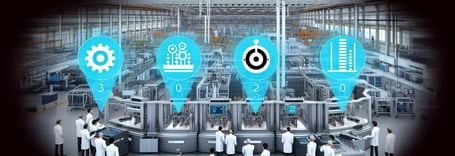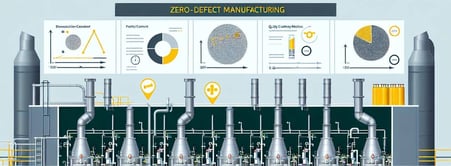Zero-Defect Manufacturing: Enhancing Product Quality and Reliability
With increasing consumer expectations and stringent industry regulations, manufacturers are constantly seeking innovative approaches to improve their processes. One such approach gaining traction is zero-defect manufacturing (ZDM), a methodology focused on eliminating defects and errors throughout the production process.
In this blog, we'll look into the significance of adopting ZDM in chemical manufacturing facilities and explore how integration between advanced planning and enterprise resource planning (ERP) systems like PlanetTogether and industry-leading platforms such as SAP, Oracle, Microsoft, Kinaxis, and Aveva can facilitate this transition seamlessly.

Zero-Defect Manufacturing (ZDM)
Zero-defect manufacturing is a philosophy that aims to achieve perfection in the production process by eliminating defects, errors, and deviations at every stage. It encompasses a holistic approach to quality management, focusing on prevention rather than detection. Unlike traditional quality control methods, which rely heavily on inspection and rectification post-production, ZDM emphasizes proactive measures to ensure that defects are not introduced in the first place.

Key Principles of Zero-Defect Manufacturing
Prevention Over Inspection: ZDM prioritizes preventing defects rather than detecting and correcting them after production. This involves robust process design, stringent quality controls, and continuous monitoring to identify and address potential issues before they escalate.
Continuous Improvement: Continuous improvement lies at the heart of ZDM. It involves ongoing efforts to optimize processes, enhance efficiency, and minimize variability. By fostering a culture of innovation and learning, manufacturers can continuously raise the bar for quality and reliability.
Data-Driven Decision Making: Data plays a crucial role in ZDM, providing insights into process performance, identifying trends, and predicting potential defects. Leveraging advanced analytics and predictive modeling enables manufacturers to make informed decisions and proactively mitigate risks.
Cross-Functional Collaboration: ZDM encourages collaboration across departments and functions to achieve common quality objectives. By breaking down silos and fostering open communication, organizations can leverage collective expertise to drive continuous improvement initiatives.

Benefits of Zero-Defect Manufacturing in Chemical Manufacturing
Enhanced Product Quality: By eliminating defects and errors, ZDM ensures that products meet the highest quality standards, thereby enhancing customer satisfaction and loyalty. Consistently delivering superior-quality products also strengthens brand reputation and competitiveness in the market.
Improved Operational Efficiency: ZDM focuses on streamlining processes, reducing waste, and optimizing resource utilization, leading to improved operational efficiency and cost savings. By minimizing rework, scrap, and downtime, manufacturers can achieve higher productivity and profitability.
Regulatory Compliance: Compliance with regulatory requirements is a critical aspect of chemical manufacturing. ZDM helps ensure adherence to quality and safety standards, reducing the risk of non-compliance and associated penalties. By implementing robust quality management systems, manufacturers can demonstrate their commitment to regulatory compliance and responsible manufacturing practices.
Reduced Risk of Recalls: Product recalls can have devastating consequences for manufacturers, leading to financial losses, reputational damage, and legal liabilities. ZDM minimizes the likelihood of defects and deviations, thereby reducing the risk of recalls and safeguarding brand integrity.


Integration of PlanetTogether with ERP, SCM, and MES Systems for ZDM
Achieving zero-defect manufacturing requires a seamless integration of production planning, execution, and quality management systems. Advanced planning solutions like PlanetTogether play a crucial role in orchestrating production schedules, optimizing resource allocation, and synchronizing operations across the supply chain. By integrating with leading ERP, SCM, and MES systems such as SAP, Oracle, Microsoft, Kinaxis, and Aveva, manufacturers can leverage the full potential of ZDM and drive continuous improvement.
Key Integration Benefits
Real-Time Visibility: Integration between PlanetTogether and ERP, SCM, and MES systems provides real-time visibility into production processes, inventory levels, and quality metrics. This enables manufacturers to monitor performance, identify bottlenecks, and take proactive corrective actions to prevent defects.
Seamless Data Exchange: By integrating disparate systems, manufacturers can ensure seamless data exchange and synchronization of critical information. This eliminates manual data entry errors, reduces latency, and improves decision-making accuracy.
Closed-Loop Quality Management: Integration facilitates a closed-loop approach to quality management, where quality data is captured, analyzed, and fed back into the production process in real time. This enables manufacturers to detect deviations early, implement corrective actions, and prevent defects from recurring.
Predictive Analytics: Integration of advanced planning and ERP systems enables predictive analytics capabilities, allowing manufacturers to anticipate potential quality issues and take preventive measures proactively. By leveraging historical data, machine learning algorithms, and predictive models, manufacturers can optimize processes and minimize the risk of defects.
Zero-defect manufacturing represents a paradigm shift in the chemical manufacturing industry, offering significant benefits in terms of product quality, reliability, and operational efficiency. By embracing ZDM principles and leveraging advanced planning solutions like PlanetTogether integrated with leading ERP, SCM, and MES systems, manufacturers can achieve unprecedented levels of quality control, minimize defects, and drive sustainable growth.
As the industry continues to evolve, adopting a proactive approach to quality management will be crucial for staying ahead of the competition and meeting the ever-changing demands of the market. Are you ready to take your manufacturing operations to the next level? Contact us today to learn more about how PlanetTogether can help you achieve your goals and drive success in your industry.